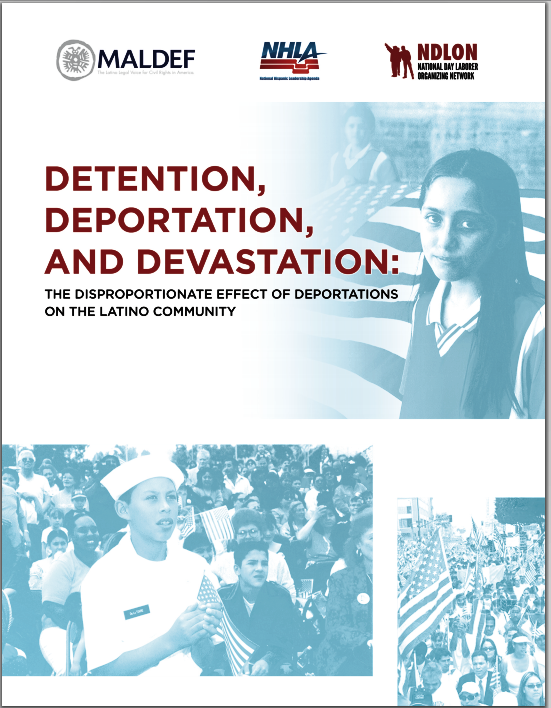Our Immigration System is Broken
- Family reunification is a significant concern for the Latino community due to backlogs that continue to plague our immigration system. Latinos sponsor 40 percent of all family-based immigrants. There are currently 4.5 million people in the family immigration backlog. As of February 2013, U.S. Citizenship and Immigration Services was processing some family-related visa applications filed as far back as June 1989. This is an intolerable situation for far too many families that demands immediate change
- Each year, more than 350,000 people are incarcerated in detention centers, including people seeking asylum, legal residents, children, the mentally ill, and the chronically ill – sometimes in appalling conditions, often with no access to legal counsel.
- U.S. citizens and legal residents are being unlawfully jailed and in some cases even deported.
- Undocumented migrants remain in the shadows even if they have been in the U.S. for years or decades. A report from the Pew Hispanic Center estimates that nearly two-thirds of undocumented immigrants living in the United States have been in the country for at least ten years. Most fill key gaps in the labor market, but they often toil long hours for low wages in poor working conditions, marginalized from the rest of society and separated from their families. Temporary workers and other legal workers, often face similar workplace abuse.
- Families are being torn apart. Nearly 45,000 undocumented parents of U.S. citizen children were deported in the first six months of 2012, and at least 5,100 of their children now live in foster care in 22 states, creating considerable public cost and great human suffering.
- Only 8% of those detained through the Department of Homeland Security’s (DHS) mandatory Secure Communities “partnership” program have been charged with being removable following an aggravated felony conviction, according to one recent study. Most have been detained because they are believed to be undocumented or on other immigration grounds.
- An estimated 84% of individuals detained by the immigration enforcement system have no attorney.
- In the absence of federal legislation, more than 40 states have passed their own immigration laws, as have some municipalities. While a few protect immigrant rights or provide in-state tuition for DREAMers, the vast majority are anti-immigrant.
Immigration Reform is Good for the Economy
- With an aging U.S. population, immigrant workers who typically arrive in their 20s will provide improvement to our nation’s dependency ratio (the proportion of children and retired people compared to economically active workers).
- People willing to risk coming to a new country are typically highly motivated and ready to work hard.
- Immigrants have a higher labor force participation rate than native-born Americans. And the country will need the talent and sacrifice of both highly trained and less skilled workers.
- Immigrants often help the economy by starting new businesses. Immigrants make up 14% of the population but are 18% of small-business owners, together providing about 4.7 million jobs. During the 1990s immigrants developed more than one-third of Silicon Valley high-tech start-ups.
- Between 50% and 70% of the nation’s 1.2 million agricultural workers are undocumented, and U.S. citizens will not take such jobs, even in difficult economic times. According to Time Magazine (September 21, 2012), “acute labor shortages brought on by anti-immigration measures” passed by states such as Alabama, Arizona, and Georgia, threaten record losses, with the American Farm Bureau Federation predicting that “Nationwide, labor shortages will result in losses of up to $9 billion.”
- The libertarian Cato Institute predicted in 2012 that comprehensive immigration reform, including a path to citizenship for undocumented immigrants, “would yield at least $1.5 trillion in added GDP over 10 years as a result of increased consumption, job creation and additional tax revenue.”
America’s Broken Immigration System Breeds Due Process Violations
- State anti-immigrant laws like Arizona’s SB 1070 “virtually guarantee racial profiling, discrimination and harassment against all Latinos.” Together, these laws have contributed to a climate of fear and intimidation affecting millions of U.S. citizens and legal residents.
- As the largest and fastest growing ethnic group in the nation, Hispanics now total 53 million and make up 10% of the U.S. electorate. Latino population and voting power — projected to outpace all U.S. communities over the next twenty years — will only continue to grow.20
- 93% of Latinos under the age of 18 are U.S. citizens, as are 74% of Latino adults (63% native born and 11% naturalized).
- Regardless of immigration status, every Latino in the United States can have his/her civil rights violated by states and localities engaging in legally sanctioned racial profiling, be held for days in a local jail without charge, and detained without due process.


